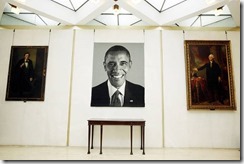View 802 Monday, December 16, 2013
“Transparency and the rule of law will be the touchstones of this presidency.”
President Barack Obama, January 31, 2009
Christians to Beirut. Alawites to the grave.
Syrian Freedom Fighters
What we have now is all we will ever have.
Conservationist motto
If you like your health plan, you can keep your health plan. Period.
Barrack Obama, famously.
Cogito ergo sum.
Descartes
\
Cogito cogito ergo cogito sum. Cogito,
Ambrose Bierce

One observation I can confirm: for many of us, getting old does not result in a lot of time on our hands, because the simpler routine tasks we all have to do become more time consuming and eat all our time and energy. That is certainly happening to me. That’s what has happened to me this weekend; nothing big or difficult, just making some appointments and attempting to deal with the County Court system over Jury Duty, and stuff like that as well as Christmas; but I find that dealing with people on the telephone can be frustrating. I can’t hear them, and they seldom talk into the telephone, and they seem to up the speech rate and shout which is not quite the way to get me to understand.
One of the appointments I made is with the audiologists, after which I will pursue an expensive but said to be effective hearing device. Maybe that will make some of the more routine stuff easier to do and less draining of energy. We can hope so.
I am now about the oldest person I know. I must know some who are older, but I don’t interact with them often, so it is safe to say I am the oldest person I communicate with regularly, which means that I am sailing unpiloted into this dark sea. It sure beats the alternative.
![clip_image002[1] clip_image002[1]](http://www.jerrypournelle.com/chaosmanor/wp-content/uploads/2013/12/clip_image0021_thumb8.gif)
There is more background to the views of the Holy Father on Capitalism than most of his detractors are aware of; and it must always be remembered that he is a spiritual leader, whom many believe to be the Vicar of Christ on Earth, and thus has no choice whatever about what he advocates regarding the plain duty of those possessing this world’s goods toward the poor and downtrodden. He must advocate obedience to the powers that be, but he must act for those not protected by those powers. He must be an advocate for the poor and helpless. How could he be otherwise.?
His Holiness speaks for and to the world’s Catholics. Many, both Catholic and non-Catholic, would say that others would do well to listen to him, and one of his duties is evangelism in the non-Catholic world, but his primary duty is to speak to the Faithful.
He is also but a man. When he says that he is not a Marxist but there are things worth considering in Marxism he speaks as a public man as many of us do, and many would agree with him. Marx predicted that capitalism would result in greater and greater concentration of wealth in fewer and fewer hands. It seems clear enough to me that left to itself, unrestricted capitalism does result in greater concentrations of wealth, which leads to greater temptation to those of power to take that wealth. Sometimes it is done in the name of national unity and the wealth is directed rather than confiscated, as opposed to direct confiscation in the name of the people.
Marxism specifies that class warfare is inevitable and will destroy society; the only remedy is to eliminate class warfare by eliminating classes. Once the victory of the proletariat is achieved through public ownership of the means of production the class war ceases, and all that is left is for government itself to wither away since there is nothing left to fight about. To achieve that result the Communist must be patient enough to allow all the situation to develop, to allow the Capitalists to concentrate their power and eliminate the middle class, otherwise class warfare will continue. Others claim to be true Marxists but have other interpretations. Among those were the followers of Trotsky who saw the development of the Regime in the USSR as merely building a new class – what Djilas called The New Class – which would rule and oppress the people. Some of the followers of Trotsky in the United States mutated into what is now called neo-conservatism.
Fascism accepted much of Marx and his economic science, but did not accept the premise that the only solution to class warfare was elimination of the bourgeoisie, and some would argue that Marx himself never accepted that. Do note that Mussolini died shouting the praise of Socialism, and never claimed to be anything but a good Marxist Socialist. He did not write consistent essays on the theory of Fascism, but others including his son in law did, and the main theory of Fascism was that the only way to end class warfare was not to end the existences of classes – that is counterproductive because it is impossible — but to required the classes to work together. The legislature consists of representatives of the institutions – Church, Labor, Shop Keepers, Land Owners, Manufacturers, Educators, the Military, and other indispensible organizations – who try to work out procedures which advance the people, who are the State; and to be sure that they work together, the Leader is empowered to require them to work together for the good of all.
Capitalism insists that Marxism doesn’t work, and leads to economic disaster as well as the creation of a new ruling class; at one time identified as The Party, but later it was recognized that a much smaller group within the Party, the Nomenklatura, are the actual rulers. This group ends most of the factionalism and thus the blood purges; it emerged in strength after Stalin’s purges and basically took control of the USSR following the Hungarian Insurrection.
There have been many attempts to make a moral case for Capitalism, but they all founder on the historical trends: when capitalism is unrestricted, wealth multiplies, but it also concentrates, and the pressure is on to allow anything to be legal and sold in the market place. I have argued elsewhere that an inevitable result of unbridled capitalism is the sale of human flesh in the market place. And I think no one can argue that there is not a strong tendency to concentration of wealth.
Of course there is wealth. More wealth than any other system can produce. What His Holiness did not seem to notice is that in capitalist nations the definition of the poor, in terms of calories consumed, ability to travel, access to good water, health care, often exceeds the definition of wealth in much of the world. It is easy to be blinded by the concentration of wealth, and the great power of Goldman Sacks, Bill Gates, is easily seen, while the negative income taxes and “food” stamps credit cards are not seen. The poor are poor enough in these United States, but they are fairly wealthy compared to the normal condition of many I knew in Memphis in the 1930’s – and I didn’t know any really poor people. But I did know families who were grateful if I brought over a potato from the bushels we kept in our garage.
My point is that Pope Francis is correct when he reminds his people that we are not in this world primarily to acquire more and more wealth. He says no more than “What doth it profit a man though he gain the whole world but suffer the loss of his own soul?” He resents the concentration of wealth, but perhaps pays too little attention to the economic effects: the wealth is concentrated in many overtly Socialist dictatorships as well, but in those places the bourgeoisie such as it is is not appreciably wealthier than then the poor in the United States. But it is not the goal of Catholics to be the wealthiest corpse in the churchyard, and His Holiness is right to remind us so in this Advent season.
For more on Capitalism and Catholicism, see http://distributist.blogspot.com/2007/01/distributism-vs-socialism.html
I am not arguing the notion that a distributist society would be as productive as capitalism. I am suggesting that the original notion of a Nation of States would have allowed us a demonstration of the possibility; and in any event, Belloc and Chesterton are worth knowing about. As Burke says, for a man to love his country his country ought to be lovely; it is always worth discussing what this means. The United States have been blessed in this Millennium with remarkably restrained persons of enormous wealth; but it does not change the oddity of the growing discrepancy between wealth and poverty even as the wealth of the very poor rises as well.
Pope Francis is incorrect in saying nothing trickles down to the poor. He is not incorrect in reminding us all that wealth is not the only goal in life.
![clip_image002[2] clip_image002[2]](http://www.jerrypournelle.com/chaosmanor/wp-content/uploads/2013/12/clip_image0022_thumb7.gif)
A session in the American Embassy to the Court of St. James:

Another picture of the far wall:

I do not know if that is standard in other embassies. It is of course quite standard to have a portrait or photograph of the President in those places, and generally one of George Washington.
![clip_image002[3] clip_image002[3]](http://www.jerrypournelle.com/chaosmanor/wp-content/uploads/2013/12/clip_image0023_thumb6.gif)
A few interesting observations from readers. We may return to some of these subjects.
Jerry,
More of Mr. Niven’s legacy:
The US Air Force Band Flash Mob at the Smithsonian http://www.youtube.com/watch?v=gIoSga7tZPg&feature=youtu.be
Jerry
TED is touting this stretchy spacesuit as “a concept no one has seen before:”
http://www.bostonmagazine.com/news/blog/2013/12/10/mit-biosuit-system-dava-newman/
except in Analog and other places in the 1970’s.
Ed
And in dozens of my stories and papers…
“This is a concoction to justify the giving out of medication at unprecedented and unjustifiable levels.”
<http://www.nytimes.com/2013/12/15/health/the-selling-of-attention-deficit-disorder.html>
Roland Dobbins
‘It’s almost as if the non-consumer part of the Chinese economy had reverted to the 1930s, when each province issued its own legal tender.’
<http://thediplomat.com/2013/12/chinas-shadow-currency/?allpages=yes>
Roland Dobbins
Thuktun Flishithy spotted?
<http://www.wired.com/wiredscience/2013/12/saturn-rings-peggy/>
Roland Dobbins

And I call your attention to this one:
Earth Was Warmer in Roman Times
http://dailycaller.com/2013/12/13/study-earth-was-warmer-in-roman-medieval-times/
and
http://dailycaller.com/2013/11/13/multiple-lines-of-evidence-suggest-global-cooling/
We all know this, but apparently it is finally becoming known outside a small circle of readers. There Here was very little man-made greenhouse gas in Roman times, or in Viking times for that matter, and even less in Holocene times when the temperature was 9 degrees C higher than it is at present. And the Earth hasn’t been getting warmer since 1997.

Freedom is not free. Free men are not equal. Equal men are not free.
![clip_image006[1] clip_image006[1]](http://www.jerrypournelle.com/chaosmanor/wp-content/uploads/2013/12/clip_image0061_thumb.gif)

![clip_image006[2] clip_image006[2]](http://www.jerrypournelle.com/chaosmanor/wp-content/uploads/2013/12/clip_image0062_thumb.gif)
© 2013, jerrypournelle. All rights reserved.


 on
on 





